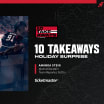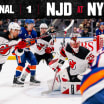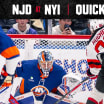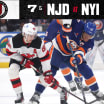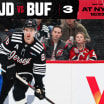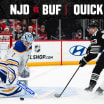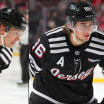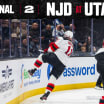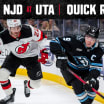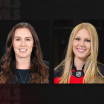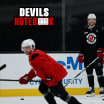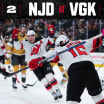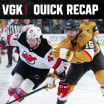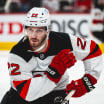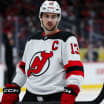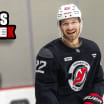When the Devils arrived in New Jersey, they needed a good selling job. Big-time.
"Look at it this way," says the club's radio analyst, and former goalie, Glenn (Chico) Resch, "we had a lot of challenges to overcome and that included the franchise's earlier failures in Kansas City and then Denver. We had to cultivate fans any way possible."
Resch was Exhibit A: the quintessential role model as a solid, former Stanley Cup-winning goalkeeper with the Islanders who now adored the New Jersey fans as much as they loved him right back.
Exhibit B was a guy who nobody had ever heard of except, perhaps, his immediate family and close friends.
Larry Hirsch already had paid his broadcasting dues, starting with a college radio gig, then a radio news assignment, then broadcasting Yale hockey followed by a leap -- albeit short -- into the NHL realm doing play-by-play for the late and not-too-lamented Cleveland Barons.
Unfortunately for gung-ho Larry, the Barons disappeared as fast as they had arrived and soon merged with the Minnesota North Stars. Unfortunately and conspicuously without the Hirsch man.
Again landing on his feet, the peripatetic Hirsch now found himself in Tinseltown where he became a weekend sports anchor with KHJ Channel 9 at RKO Station television.
At around this time the new, newly purchased New Jersey Devils were on the lookout for a radio play-by-broadcaster. The club's owner Dr. John McMullen couldn't have known it at the time, but Doc Mac also would be hiring an idol of the crowds, a master marketing maven and someone who could cheer the fans through his club's growing pains.
"Larry had been recommended to me," McMullen once recalled, "and I decided to interview him. I suggested that he meet me at one of my favorite places, the Montclair Country Club."
The Master Blaster of Long, Long Ago | 40 YEARS WITH STAN
Stan Fischler shares the story of Larry Hirsch and the Master Blaster moniker
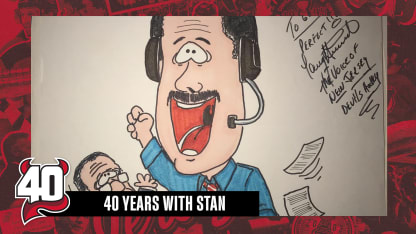
Having owned the Houston Astros baseball team as well as the Devils, Doc Mac knew his onions whether he was talking about a horsehide or a six-ounce hunk of vulcanized rubber, affectionately known as a puck.
As a high school football star and World War II Naval hero, McMullen understood what genuine excitement was all about. When he greeted Hirsch at the Montclair Country Club, The Doc sensed something exciting about the young man.
McMullen: "He named his favorite sports announcers -- Marv Albert among them -- and then he made me a 'guarantee' that if he didn't do a helluva job after a year, I could fire him."
In an interview with author Matthew Blittner for his book, "Unforgettable NJ Devils -- Games & Moments From The Press Box, Ice & Front Office," Hirsch vividly remembered his first encounter with The Boss.
"I didn't hold back," says Hirsch. "I told Doc right off the bat that if he gave me three years, his Devils would be the most listened to the team on the radio. Of course, Mac had been around so he called my bluff.
"He shot back, 'And how, may I ask, do you plan to do that?' And I came right back and said, 'Dr. McMullen, let me tell you that that is what I do best.'"
This was in July 1982. Within five days Larry had secured his dream job except one not-so-minor thing was missing. Since Hirsch couldn't do play-by-play by shouting out of a window at the Meadowlands Arena, he needed a radio station to air the games.
With typical Hirsch-type hustling, he ran into a guy who knew Herb Salzman, who owned WVNJ, a radio station in New Jersey. Employing a little schmooze, here and a little schmooze there, Larry sold himself, the Devils (still virtually unknown), and the WVNJ station guru a bill of goods that led to a meeting with the guru and Mac. Poof! Just like that New Jersey Devils hockey would be on a genuine radio station (WVNJ) that would have made Guglielmo Marconi proud.
Hirsch: "Before we did our first game, we had a press conference and Larry Brooks, who was our Devils PR guy, knew Fred Shero. Only seven years previous, Shero had won his second Stanley Cup, coaching the Philly Flyers.
"Well, what a heck of a break that was for me. Brooks got Shero to be my 'color' guy and that turned out to be amazing because I learned a ton-and-a-half about hockey from Fred. Better still, we got along fine 'cause I taught him about the radio game and he taught me about the game of hockey. It was a perfect double-dip."
Again the wheels were going a hundred and fifty miles an hour in Larry's medulla oblongata. He envisioned a movie marquee that proclaimed, "Abbott and Costello" and "Hope and Crosby" and "Groucho, Chico, and Harpo."
And then the brainstorm burst: "I crowned us as 'The Master Blaster" because of the way I did hockey and "Doctor Hockey" because Fred knew everything about sticks and pucks and winning Cups."
Shero was the cream in Hirsch's coffee and the fans loved the taste of it. One of them was Larry Berger, a high school student in New Jersey who followed the Devils broadcasts on WMCA, the larger station that took on Larry's play-by-play.
Berger, who is in the midst of a 30-year sports media career, would sit enthralled in his Chestnut Hill, N.Y. home as Hirsch jobbed through a broadcast.
"I listened to Larry religiously," Berger recently wrote to me. "He was a legend in my eyes. So much so that I used to record his broadcasts on a cassette off my clock radio."
(Recently writing about Hirsch for the Bergen Record, Berger found the 35+-year-old tapes in his parent's closet. He had them transferred to digital and included them in an online version of the article.)
Berger: "Larry's ebullience took on many forms, including broadcasting while standing (and jumping) on a desk atop his perch. He worked adjacent to an aisle in the last row of Section 108; or as he put it, 'Row A, eat 1' at Brendan Byrne Arena."
Resch keenly remembers that The Master Blaster did more than just broadcast the game. He was promoting the Devils, the NHL, and the fans themselves who Larry deftly brought into his act.
Hirsch: "One of the things we did was a 'Call-In' show in between periods called 'Dial The Devils.' I'd have all kinds of hockey people on; folks I'd meet in the press room or in the lobby. I gave out our number to fans and had them participate. I'd get their names on a list and then give it to our ticket department to hustle new fans."
The beauty part is that The Blaster was creating new supporters by the trainload despite Devils teams that plumbed the NHL depths. No problem. Larry had The Knack and he captured their attention -- and admiration -- with his unique broadcasts.
"No question," recalled Berger, "those early New Jersey squads were bad. Really bad. But Larry did a masterful job of recruiting new Devils fans including ones previously aligned with the local hockey blue bloods -- the Rangers, Islanders, and Flyers."
This was possible because -- instead of hustling home after a broadcast -- he'd hang out with fans after the games until he ran out of schmoozers. Anyone who'd witnessed Larry interplaying with the fans -- as I had the pleasure of doing -- would be hard-pressed to determine who was having more fun, the professional broadcaster or his adoring audience.
"Remember the promise I made to Doc Mac about how in three years we'd be Number One?" Hirsch chuckled. "Well, we were Number One after that first year, or right at the end of that first year. The ratings came out and we were the most listened to because I got the fans involved."
Retired and living in Florida, Hirsch could reel off unforgettable moments with the ease and speed of a tobacco auctioneer repeating bids. My personal favorite is his recollection of the 1984 All-Star Game which Larry handled as a regular local broadcast as well as for Armed Forces Radio.
"We were heard all around the world," smiled The Master Blaster. "And I got to introduce the home team -- The Prince of Wales team. What I also did was something that I'd been thinking about backstage. I decided to verify the 'hook' I had created in New Jersey.
"So, I went up to the podium and I said, 'Welcome to the Hockey Taj Mahal of the world; the Meadowlands, Brendan Byrne Arena. And they didn't like Brendan Byrne. The boos started a little bit and then I said, 'and home of NEW JERSEY DEVILS HOCKEY!
"And the fans went nuts. I was able to introduce the team and the last person was, 'and in goal, number one from the New Jersey Devils, GLENN CHICO RESCH.' The fans loved that and they loved Chico and that was my biggest thrill."
Larry Berger even suggests -- since Hirsch made the game so much fun for the fans -- that perhaps Hirsch's name should hang in the rafters of The Rock.
"Larry's impact was huge," Berger concluded, "and his contributions are worthy of discussion of that great honor."
- Larry Hirsch cartoon by George Falkwoski

